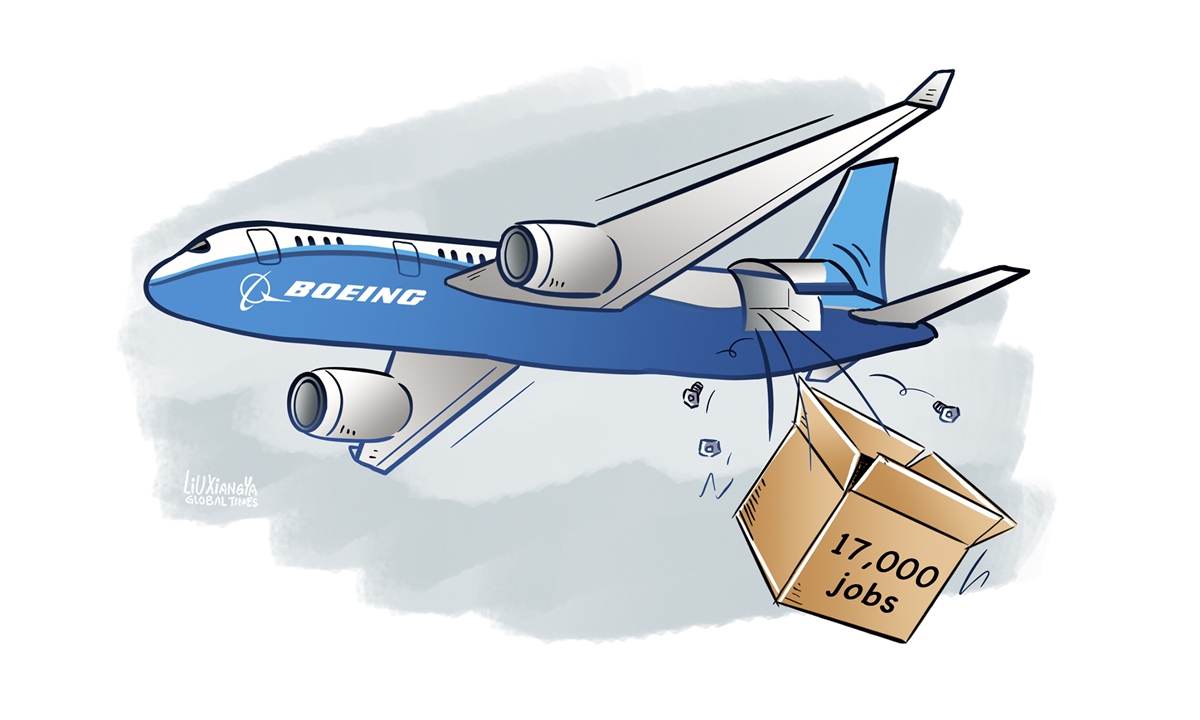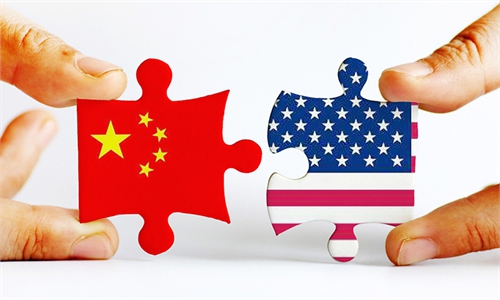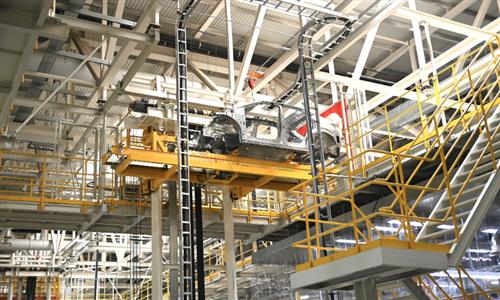
Illustration: Liu Xiangya/GT
Citing government-required filings and a union official, Reuters reported on Tuesday that Boeing will lay off more than 2,500 workers in the US states of Washington, Oregon, South Carolina and Missouri, as part of the debt-heavy US planemaker's plan to cut 17,000 jobs, or 10 percent of its global workforce. The layoffs have drawn significant attention, as the company, to some extent, provides a valuable perspective on the US manufacturing sector.As a key player in the US aviation industry, Boeing is often referred to as the "crown jewel" of American manufacturing. It represents the pinnacle of industrial expertise in the sector. However, the various challenges Boeing has faced in recent years - such as the reported layoffs - highlight broader struggles within the American manufacturing industry, serving as a microcosm of its overall decline.
US manufacturing activity remained weak in October, with the ISM Manufacturing PMI falling to 46.5 last month, indicating contraction for the seventh consecutive month, according to Reuters. The US manufacturing industry was once a global leader, but since the 1980s, it has gradually declined, resulting in the hollowing-out of domestic industries.
In recent years, Washington has pushed for re-industrialization, even implementing trade protectionist measures in an attempt to bring manufacturing back to the US. Yet, the overall results have been disappointing. Frankly speaking, many long-standing challenges facing US manufacturing remain unresolved.
Protectionist trade policies are unlikely to restore US manufacturing to its former dominance. Reviving American manufacturing requires a more pragmatic approach.
Boeing has provided valuable insights, with a history spanning more than a century. Over that time, it has grown into one of the world's largest aerospace companies and a leading US exporter. Throughout this journey, international markets have played an important role in driving Boeing's profitability. Boeing's success highlights the importance of openness and international cooperation, while trade protectionism and economic "decoupling" can only lead to counterproductive outcomes.
Boeing said on its website that global business drives its growth and secures its "leadership position" now and in the future. Boeing's global reach includes customers in approximately 150 countries and employees and operations in more than 65 countries. The company has manufacturing, service and technology partnerships with companies and governments worldwide and contracts with more than 20,000 diverse suppliers and partners.
In the era of economic globalization, it is not difficult to imagine that a trade policy that favors protectionism would be harmful not only to Boeing but also to other US manufacturing companies that are deeply integrated into the world market and global supply chain. The development of the US manufacturing industry is closely tied to increased international cooperation.
It is undeniable that while US manufacturing has been in decline, it still maintains a strong foundation and significant advantages, particularly in high-end manufacturing. If the US focuses more on developing new technologies and adopts a more open approach to strengthening cooperation with international markets and global supply chains, it could create greater opportunities for growth in the sector.
From this perspective, China is an important partner for US manufacturing. To take the example of Boeing, the company has had a long-standing partnership with China for more than 50 years. More than 10,000 Boeing aircraft in operation worldwide are equipped with components and parts made in China. China is also an important overseas market for Boeing. Cooperation with China helps expand Boeing's profits and enhance its production capacity, and lets it address some of the challenges the company is facing.
The way the US views the relationship between its domestic manufacturing sector and the global economy will play a crucial role in determining whether US manufacturing can overcome challenges and thrive in the future. Clearly, fostering mutually beneficial cooperation is far more advantageous than pursuing "decoupling" and protectionism.
The author is a reporter with the Global Times. bizopinion@globaltimes.com.cn



